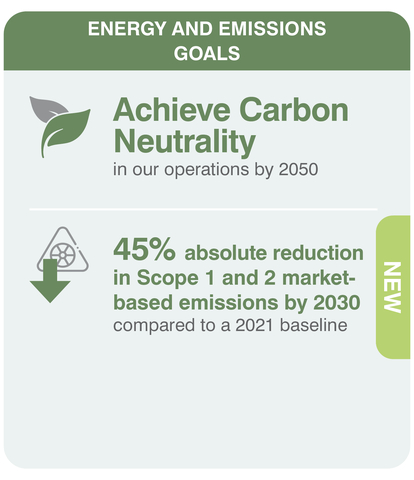Sensata Technologies Sets New Near-Term GHG Emissions Reduction Goal on Path to Carbon Neutrality
-
Sensata has established a new goal to achieve
45% absolute reduction in Scope 1 and 2 market-based emissions by 2030 compared to a 2021 baseline. - 2030 goal is consistent with climate science and the level of decarbonization required to limit global temperature increase to 1.5°C compared to pre-industrial levels.
- New goal underscores Company’s commitment to a key sustainability priority to protect the environment.

Sensata Technologies updates its Energy and Emissions goals, aiming for
As outlined in Sensata’s 2022 Sustainability Report, Energy and Emissions is one of the Company’s key material topics, in addition to Diversity, Equity and Inclusion and Responsible Sourcing.
The new goal to achieve
In 2021, Sensata committed to achieve carbon neutrality in its operations by 2050 and reduce Scope 1 and 2 market-based greenhouse gas (GHG) emissions intensity per
“Our markets and consumers are seeking solutions in electrification, and we are responding with innovative technologies and impactful new products,” said Sensata Technologies CEO and President, Jeff Cote. “We are making consistent progress with annual reductions in market-based emissions, and we are supporting customers that have set their own goals to reduce emissions in their supply chains. However, we recognize the need to do more – and our new goal for
Path to Carbon Neutrality
The new goal builds on Sensata’s long-term goal to achieve carbon neutrality in its operations by 2050. The Company’s renewable energy roadmap, designed to accelerate carbon neutrality, includes projects to improve the energy efficiency of operations and reduce greenhouse gas emissions, among other initiatives.
As nearly 90 percent of total energy consumption occurs at its manufacturing facilities, Sensata is incorporating renewable energy into its portfolio. The Attleboro headquarters, Engineering Center in Hengelo,
As part of its Energy Efficiency Playbook, Sensata continues to evaluate opportunities including LED lighting, upgrades of HVAC and other systems as well as working with energy providers to identify opportunities for bundled renewable energy supply, where available.
As climate change accelerates the need for decarbonizing the planet, these actions are part of a multipronged approach toward environmental sustainability and complement Sensata’s overall strategy to provide solutions in electrification.
Additionally, to bolster supplier engagement in sustainability, Sensata launched two supplier sustainability surveys in 2023 – a Recycled Content Survey and a Climate Change Survey – as suppliers play a significant role in reducing upstream greenhouse gas emissions associated with Sensata’s solutions.
Read Sensata’s 2022 Sustainability Report to learn more about the Company’s commitment to a more sustainable future at www.sensata.com/sustainability.
About Sensata Technologies
Sensata Technologies is a global industrial technology company striving to create a cleaner, more efficient, electrified and connected world. Through its broad portfolio of sensors, electrical protection components and sensor-rich solutions which create valuable business insights, Sensata helps its customers address increasingly complex engineering and operating performance requirements. With more than 21,000 employees and global operations in 16 countries, Sensata serves customers in the automotive, heavy vehicle & off-road, industrial, and aerospace markets. Learn more at www.sensata.com and follow Sensata on LinkedIn, Facebook, X and Instagram.
View source version on businesswire.com: https://www.businesswire.com/news/home/20240124086831/en/
Investor Contact:
Jacob Sayer
+1 (508) 236-1666
jsayer@sensata.com
Media Contact:
Alexia Taxiarchos
+1 (508) 236-1761
ataxiarchos@sensata.com
Source: Sensata Technologies






